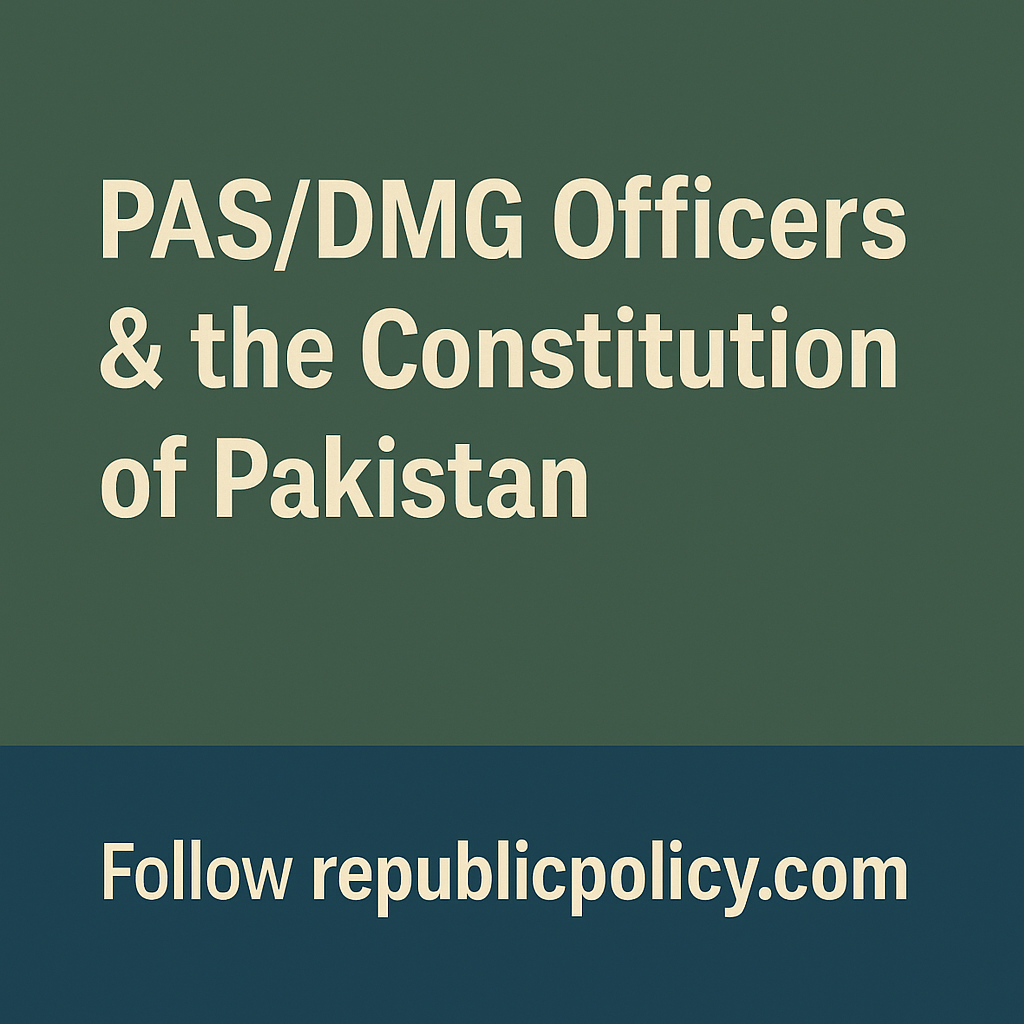Noman Khan
The constitutional framework of civil services in Pakistan is not a matter of ambiguity but of clarity. The Constitution of 1973 lays down a precise structure for appointments, posts, and services, rooted in the federal parliamentary spirit. Articles 240, 241, and 242 are central to this framework. They define how services are to be created, by whom they are to be regulated, and where authority rests between the federation and the provinces. These provisions, when read alongside Articles 142, 97, 137, 118–121, and the institutional role of the Council of Common Interests, establish a tri-fold system: federal posts for federal subjects, common posts for common subjects, and provincial posts for provincial subjects. Yet, despite this clarity, Pakistan continues to suffer from a creeping centralization of civil services, primarily through the persistence of the colonial-era scheme of reserved posts.
This scheme was deliberately excluded by Quaid-e-Azam at the time of independence, but in 1954 it was reintroduced through CSP Composition and Cadre Rules. Ever since, the federal bureaucracy—especially PAS and PSP—has monopolized authority across tiers, reserving provincial posts and imposing itself where the Constitution never intended. The Constitution is categorical: federal posts are confined to matters like defense, foreign affairs, currency, taxation, and federal ministries. Common posts are limited to subjects overseen by the Council of Common Interests, such as energy, railways, and inter-provincial trade. Provincial posts are for education, agriculture, health, policing, local governance, land revenue, and social services, all to be managed and legislated by provincial assemblies and filled through provincial public service commissions.
Despite this clarity, the misuse of the phrase “All Pakistan Service” has enabled a constitutional distortion. In constitutional language, an All Pakistan Service means a service created by Parliament to serve common institutions overseen by the federation and provinces together, never to occupy purely provincial posts. To treat chief secretaries, provincial IGs, or secretaries of agriculture, health, or education as common posts is a clear encroachment. Yet federal services continue to justify this practice by hiding behind executive orders, outdated rules, and the so-called saving clauses of Article 241, which expired once new legislations were required under Article 240.
This distortion has created a governance model that is unitary in nature while Pakistan is federal in structure. In a federation, the legislature produces the executive, both political and bureaucratic. Just as the National Assembly produces the federal executive, so too must the provincial assemblies produce their bureaucratic executive. For example, if Punjab Assembly elects a Chief Minister, it must also create and control the post of Chief Secretary. Allowing the federal bureaucracy to fill that post contradicts the parliamentary principle and transforms civil services into an unaccountable power structure.
The federal bureaucracy has historically manipulated the Federal Civil Servants Act to extend its reach, but that Act applies exclusively to federal employees, not provincial ones. Provincial Civil Servants Acts regulate provincial officials, and no federal law can override this domain without dismantling the constitutional federal structure itself. Even if Parliament were to amend Article 240, such changes would collapse before constitutional interpretation, because the Constitution cannot be read in isolation. Federal parliamentary governance is its foundation, and Article 240 is subject to that scheme. Unless Pakistan becomes a unitary state where provinces no longer exist, provincial posts cannot be constitutionally reserved for federal cadres.
The 18th Amendment has reinforced these principles by clarifying legislative and executive separation more clearly than ever before. Federal and provincial authorities are not hierarchical; they are parallel and sovereign in their respective domains. The only shared space is in Part II subjects, supervised by the Council of Common Interests. Outside that, intrusion is unconstitutional.
This reality exposes the fragility of the current system. Outdated CSP/DMG/PAS and PSP rules of 1954, carried forward through executive persistence, continue to bypass constitutional law. The bureaucracy has skillfully maintained control by exploiting political instability and by misleading elected representatives. But the truth is simple: the Constitution no longer validates these arrangements.
For reforms to succeed, political executives and legislators must understand this constitutional framework. If they allow themselves to be deceived by bureaucratic manipulation, reforms will fail. If they embrace federalism, they can constitutionalize civil services by respecting the three domains of posts and services. The choice is stark: either Pakistan remains a federation with genuine provincial autonomy, or it allows bureaucracy to centralize authority into a unitary structure, eroding the very spirit of 1973. The constitutional order is clear. It is now for the political leadership to act with courage.
The Writer is a Provincial Civil Servant
















